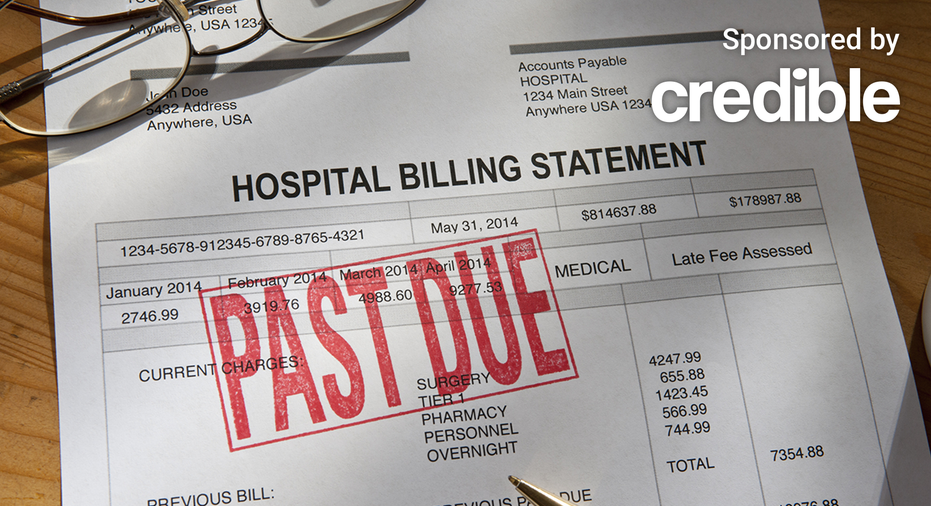15 million Americans still harmed by medical debt despite credit agencies' changes
Legislative bill seeks to eliminate all medical debt

Americans delay medical care because of rising costs. (iStock)
Millions of Americans continue to have their credit dinged by medical debt despite changes to how this debt should be reported, the CFPB said in a report.
To support those who are faced with unexpected hospital bills, Equifax, Experian and TransUnion last year implemented steps to remove nearly 70% of medical debt in collections from credit reports. The companies announced they would increase the time before medical bills in collection can appear on credit reports – from 180 days to one year. Additionally, medical bills that had been in collection but were resolved would no longer appear on credit reports and any medical debt under $500 would be excluded.
While the frequency of medical debt appearing on credit reports has declined, the CFPB said some 15 million Americans are still struggling with more than $49 billion in outstanding medical bills in collection on their credit reports. That is primarily because the changes only helped remove smaller balances. As a result, the average balance of the remaining reported medical bills on credit reports has increased from $2,000 to more than $3,100, according to the CFPB.
"Experian, Equifax and TransUnion took steps to remove many medical bills in part because of the recognition that they hold little predictive value," CFPB Director Rohit Chopra said. "Findings from our latest research reveal the impact of these changes and the need for further reforms."
If you are struggling financially, you could consider paying down your debt with a personal loan and consolidating your payments into a lower interest rate, saving you money over time. You can visit Credible to find your personalized rate without affecting your credit score.
BUY A HOME IN THESE STATES TO GET STUDENT LOAN DEBT RELIEF
Legislative bill proposes eliminating all medical debt
Sens. Bernie Sanders (I-Vt.) and Jeff Merkley (D-Ore.) proposed a new legislative bill to eliminate $220 million in medical debt and scrub it from credit reports.
The bill would create a federal grant program to cancel medical debt, prioritizing low-resource providers and vulnerable populations. It would amend the Fair Debt Collection Practices Act, making collecting past medical debt bills illegal.
The legislation would also update billing and debt collection requirements for medical providers to limit the potential for future debt to be incurred. Additionally, it proposes to amend the Consumer Credit Reporting Act to prevent credit agencies from reporting information related to unpaid medical bills.
"Medical debt and aggressive collection practices cause our patients to delay necessary care and destroy the trust necessary for healing relationships," said Luke Messac, Harvard Medical School emergency physician and historian. "Most healthcare workers do not want to be part of a system that does such damage to our patients' lives. This bill helps prevent this harm by cancelling debt, improving access to financial assistance and preventing medical bills from ruining credit scores."
If you have accumulated debt, you could consider using a personal loan to help you pay it down at a lower interest rate. Visit Credible to compare multiple personal loan lenders at once and get prequalified in minutes.
HOMEOWNERS COULD SAVE TENS OF THOUSANDS IN DAMAGES BY USING SMART DEVICES
This is how Americans paid medical debt
As prices rise, 68% of Americans said they can't afford to pay their medical bills on time and 48% delayed medical care because of increasing costs, according to a recent AccessOne survey.
Nearly one-third of consumers say they are "not confident at all" they could pay a medical bill of $500 or more. To pay medical expenses, 10% of Americans have had to dip into personal expenses, while 32% have used a credit card to pay their bill when their income isn't sufficient.
"Providers with transparent and affordable repayment options are winning share in a market where short-term banking trends are squeezing credit access and long-term benefit design trends push more and more cost to the consumer," AccessOne CEO Mark Spinner said.
If you are dealing with unexpected expenses, you could consider using a personal loan to pay down debt at a lower interest rate. Visit Credible to compare multiple lenders at once and choose the one with the best interest rate for you.
MORTGAGE LOAN LIMIT RISES ABOVE $1.1M AS HOME PRICES SURGE
Have a finance-related question, but don't know who to ask? Email The Credible Money Expert at moneyexpert@credible.com and your question might be answered by Credible in our Money Expert column.




















